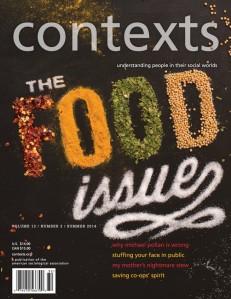
Summer 2014
Volume: 13 | Number: 3
Mapping the Flavors of New York City
Artist Hanna Kang-Brown and Sociologist Jacob Kang-Brown explores food as a medium for understanding the U.S. census, representing neighborhood data with spices and using the tasting experience to create a new conversational space in which to talk about the ways in which we identify ourselves and others and how that is shaped by census design. Read More
Food Shopping: A Chore or a Pleasure?
Women perform twice as much “foodwork” as men—shopping, cooking, and planning meals. We often think of food shopping as a chore, but it turns out … Read More
Irish Food Nationalism
The Great Famine of the nineteenth century killed one million Irish citizens, and forced as many to emigrate. Its legacy continues to be felt today … Read More
Eating, Then and Now
Sociologist Tracy E. Ore explores how transformations in American social practices of work and life changed and were changed by what and how people ate at the turn of the century, and how these trends continue today. She reviews Buying into Fair Trade and Repast. Read More
Weighing the Evidence
Sociologist Michael Bader reviews two books, Fat Chance and What's Wrong with Fat?, that hope to reshape the debate about obesity in America. Read More
Culinary Capitalism
Sociologist Shamus Khan writes about life of the modern food system, and how it may well be the greatest triumph of capitalism. Read More
The Joy of Cooking?
Sociologists Sarah Bowen, Sinikka Elliott, and Joslyn Brenton offer a critique of the increasingly prevalent message that reforming the food system necessarily entails a return to the kitchen. They argue that time pressures, tradeoffs to save money, and the burden of pleasing others make it difficult for mothers to enact the idealized vision of home-cooked meals advocated by foodies and public health officials. Read More
Inside the Extreme Sport of Competitive Eating
Sociologist Priscilla Ferguson considers competitive eating as an expression of identifiably American connections between abundance and country. Overeating both honors country and transgresses social norms. Read More
Eating Military Base Stew
Sociologist Grace M. Cho investigates the origins of a Korean dish called budae jjigae ("military base stew") and reveals its layered meanings for Korean American diasporic identity. Read More
Meat Masculinity
Scholar Ricardo G. Costa Filho explores Brazilian meat brand Friboi’s recent advertising campaign, and finds an intricate connection between hygiene, masculinity, and animal protein consumption. Read More
